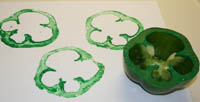Before we made the decision to homeschool, and as I started homeschooling a year ago, I was filled with a whole bunch of fears, which left me doubtful and anxious about our decision to homeschool. Once in a while, they still sneak in, but in the past year, but I've learned to quell those fears and trust God to lead us and to be our children's ultimate Teacher. I wouldn't say they are completely overcome, but when they come up, I have some ways to combat them now.
1. Fear of what other people will think about our decision to homeschool.
I'm a people-pleaser by nature, which is something I've tried to overcome all my life, but it always creeps into my life again, so when we decided to homeschool, I was so worried about what other people would think. Not just family and friends, but also just acquaintances, like the kids' extracurricular activities' teachers, or people at the store who see might see the kids school, or my dentist when I bring my child in with me to appointments! I was worried about whether I would have a 'good answer' if people asked me why I was homeschooling. I was worried that people might be judgmental and make comments that would put me on the defensive.
What I tell myself now:
Why should I care what other people think of me and my decisions? This is my life and my kids, and different things work for different people. There are definitely going to be people who will think I'm strange...but really, I'm sure there are other plenty of people who think I'm strange whether or not I homeschool!
2. How will I know if I've taught my kids everything that "should" be taught?
When thinking about the whole breadth of knowledge that would need to be imparted to my children, I was overwhelmed with the thought that I wouldn't cover everything that Monkey would need to know, and he would "miss out" on some subjects and wouldn't be "prepared for the world", or at least, "prepared for college".
What I tell myself now:
Partially this fear stemmed from a mentality that was stuck in "school-mode", wanting to teach what would be covered in public school, but e
veryone has gaps in their knowledge base, even public schooled kids! Even the top students in school don't know
everything about American history, or world history or various fields of science. And even at the end of a good, solid education, I would bet most people when they leave high school (and definitely, 5-10 years after), don't remember most of what they "learned" in school. What's important is that they learn
how to learn about what interests them, and know how to find the information they need when they need it.
But what about the 'basics'? What if I skipped some important math concept? I've come to realize that if it's THAT important that they would need it on a regular basis, we're bound to run into it in every day life at some point, and therefore, it would be covered, even if we skipped around using different curricula that didn't follow the same scope and sequence.
Plus, with all I've been learning about right-brained learners, the schools' expectations are based on left-brained learners. Right-brained learners often learn in a different sequence...delayed reading/writing/arithmetic, but earlier science, social studies, etc. This completely takes the fear and stress out of 'Oh no! Monkey can't ever remember to punctuate!' (or can't spell or has trouble reading aloud, or keeps making simple arithmetic mistakes when he completely understands the math concepts). Every kid learns at a different pace and pressuring him to conform to some outside expectation just adds unnecessary stress.
3. What if I pick the wrong material to use?
I did so much web research on various curricula, comparing and contrasting them, thinking ahead to when I would cover what topics, that it really took up way more time than it should have. What if I purchased something and it is terrible?
What I tell myself now:
Worst case, they hate it, we lose some money, and have to buy something else. More likely case, it's not a great fit, but they do learn
something, even if it wasn't that engaging, efficient, or effective. I can always try to sell the material used, and use that toward buying something else (or using free stuff on the internet, of which there is PLENTY!) or give it to someone else as a blessing to them.
4. What if I can't manage all the juggling?
On a global scale, between working an almost-full-time job, serving at church and other organizations, extra curricular activities and house stuff, what if I just couldn't juggle it all? On a smaller scale, I'm a 'checklist' type of person, and it
bugs me if things are left undone. What if we just can't finish everything I planned to do for the week between all our other time commitments?
What I tell myself now:
There will be days/weeks when things are
not all going to be done. I
won't be able to juggle it all, and that is OK. If that means the house stuff doesn't get done, then it doesn't get done. If I have to say no to some things, I should not feel bad about saying "no". If we don't finish everything on our homeschool weekly plan, it's
OK! That's the beauty of homeschool! We can put off something to another day or the next week, or we can skip it altogether, if it's really just not going to add much value to the teaching. It's not really about trying to do
everything, it's about finding a balance to choose what is most important.
5. Isn't having Monkey with me all day, every day going to drive me crazy?
I was quite comfortable with the kids being at school for 7 hours a day, plenty of time for my job and for miscellaneous errands, and sometimes a lunch out with other moms while their kids were at school. I'd be trading a nice flexible schedule for dragging the kids around with me for all my errands, appointments, and lunch dates! Plus, honestly, doesn't every parent need a break from their kids?
What I tell myself now:
Yes, it's a trade-off, but it's been such a blessing to have time with Monkey, creating that bond between us and helping us to really understand each other. Do I need a break from him? Yes, I do! In some ways, that's where having my job sometimes works out to my benefit. He goes to a babysitter twice a week. It's not 'free' time for me though....it's work time, and I try to get as much work as possible done for my job during those hours because on average, I'm probably NOT getting as much work done the other days of the week working from home with him with me. But even if it weren't for my job, I'd make a point to schedule time for him to play with other kids (as a drop-off playdate), or signing up for a co-op or a homeschool class, and time for me to go out just by myself when my husband is home. As an introvert, I NEED to be alone at some point. So yes, it's been an adjustment to not have the freedom to just pick up and go run to the store by myself or grab a quick lunch with friends...but at the same time, I've gotten used to it. I don't plan for alot of errands, and when I do, I think of it as a chance for Monkey to see what people do in the real world and what moms need to do (we don't just sit around all day on Facebook!). As for lunch dates and appointments, sometimes I'll just take him along, or ask people to meet at my house so he just plays on his own for a bit, and I'm thankful for friends who will sometimes watch him for a short while when it's just not something I can take him to.
6. What if I mess up my kids?
This one is a biggie, but it's also the most uncalled for. I think every parent thinks this thought at some point in their parenting journey, not just homeschooling moms.
What I tell myself now:
Does homeschooling make it more likely that my kids will be "messed up"? Probably not any more likely than they'd be "messed up" by any other decision, even if public schooled. And really, it's not all in
my hands(ultimately, their hearts and lives belong to the Lord)! I think I'd be giving myself too much credit if how "well" my kids turned out is dependent on what I've done or not done. We can have influence, but so much is out of our control anyway, so I'll do my best and leave the rest up to God.












